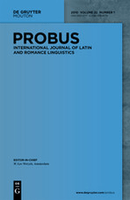
PROBUS
metrics 2024
Pioneering new perspectives in language analysis.
Introduction
PROBUS is a prestigious journal in the field of Linguistics and Language, published by De Gruyter Mouton. With its ISSN 0921-4771 and E-ISSN 1613-4079, PROBUS serves as a significant platform for innovative research, exploring diverse aspects of language study. Based in Berlin, Germany, this journal has established itself as a leading source of academic knowledge, evidenced by its Q1 quartile ranking in 2023 and notable positions in Scopus, including Rank #258 in Arts and Humanities and Rank #304 in Social Sciences relative to its peers. Encouraging scholarly discussion and interdisciplinary collaboration, PROBUS aims to foster understanding and advancement in the field, making it an essential resource for researchers, professionals, and students alike. Although it does not offer open access, the journal ensures wide dissemination of important findings through robust academic subscriptions.
Metrics 2024
 0.49
0.49 0.30
0.30 0.60
0.60 36
36Metrics History
Rank 2024
Scopus
IF (Web Of Science)
JCI (Web Of Science)
Quartile History
Similar Journals

Catalan Journal of Linguistics
Elevating the Discourse on Language Acquisition and Sociolinguistics.Catalan Journal of Linguistics is a distinguished academic publication dedicated to the dynamic field of linguistics and language studies. Published by the Universitat Autònoma de Barcelona, this open-access journal has been disseminating impactful research since 2002, making significant contributions to the understanding of linguistic theory, language acquisition, and sociolinguistics, particularly within the Catalan language context. With a robust engagement in the scholarly community, it proudly holds a Q2 ranking in Linguistics and Language as of 2023, reflecting its commitment to high standards of research and innovation. The journal is accessible to a global audience, promoting the free exchange of knowledge beyond geographical boundaries, and serves as an essential platform for researchers, professionals, and students aiming to stay at the forefront of linguistic inquiry. With its rich archive of articles, the Catalan Journal of Linguistics stands as a vital resource for anyone keen to explore contemporary linguistic issues and advancements.

Italian Journal of Linguistics
Navigating the evolving field of linguistics with authority.Italian Journal of Linguistics is a prominent academic journal published by PACINI EDITORE, dedicated to advancing the understanding of linguistic theory and application. With its inception in 1996, the journal has fostered scholarly discourse and continues to contribute to the field through rigorous peer-reviewed articles. Operating under the prestigious field of linguistics, the journal currently holds a respectable Q3 quartile ranking as of 2023, showcasing its relevance in the academic community. It also ranks in the top 30% of journals in both Arts and Humanities and Social Sciences disciplines, reflecting its impactful contributions documented in Scopus rankings. While the Italian Journal of Linguistics is not an open-access journal, it offers invaluable insights and innovative research findings, making it an essential resource for researchers, professionals, and students keen on exploring the nuances of language and linguistics. Based in Pisa, Italy, the journal serves as a significant platform for both contemporary studies and classic investigations in linguistics, appealing to an international audience devoted to this ever-evolving field.
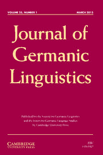
Journal of Germanic Linguistics
Shaping the Future of Linguistic ScholarshipThe Journal of Germanic Linguistics, published by Cambridge University Press, is a premier academic journal dedicated to advancing scholarship in the field of linguistics with a particular focus on Germanic languages. With an impressive impact factor and a well-established reputation, this journal attracts contributions from leading researchers and professionals who delve into the complexities of language, syntax, semantics, and phonology. The journal holds a prominent position in its category, recognized as Q2 in Linguistics and Language and Q1 in Literature and Literary Theory according to latest rankings. By fostering innovative research, the Journal of Germanic Linguistics plays a crucial role in shaping the discourse around Germanic linguistics, providing an essential platform for both emerging scholars and seasoned academics alike. Although it does not offer Open Access options, it continues to be a vital resource for the global academic community, with a convergence of works published throughout its history from 2001 to 2007 and again from 2009 to 2024, ensuring an enriching repository of research for future generations.

Suvremena Lingvistika
Illuminating the Complexities of Language and Communication.Suvremena Lingvistika is a distinguished open-access journal published by the Croatian Philological Society, dedicated to advancing research in the field of linguistics and language. Since its establishment, the journal has been pivotal in promoting scholarly dialogue within the linguistics community, especially among researchers and academics in Croatia and beyond. With an ISSN of 0586-0296 and an E-ISSN of 1847-117X, the journal has transitioned to an open-access model since 2007, ensuring that research is freely accessible to all. As of 2023, it holds a respectable Q3 ranking in the Linguistics and Language category, reflecting its potential contribution to the field. The journal's scope encompasses a wide array of linguistic disciplines, encouraging both theoretical and empirical studies. Supportive of new research, Suvremena Lingvistika aims to foster innovative approaches and methodologies in linguistics, making it an essential resource for students, researchers, and professionals eager to explore the complexities of language. With its ongoing publication until 2024, it continues to shape the linguistic landscape, providing valuable insights and fostering collaboration among scholars globally.

Voprosy Yazykoznaniya
Illuminating the Landscape of Language StudiesVoprosy Yazykoznaniya, published by the esteemed Russian Academy of Sciences and the State Academy of Humanities (GAUGN), stands as a leading journal in the field of linguistics and language studies. With an impressive Q2 rank in Linguistics and Language for 2023 and a strong position within Scopus rankings, this journal fosters scholarly dialogue and pushes the boundaries of linguistic research by providing a platform for innovative studies, reviews, and analyses. Although not open access, its publication ensures high academic standards and visibility within the global academic community. Researchers, professionals, and students alike can benefit from the rich insights and diverse perspectives presented in this journal, serving as a vital resource for anyone interested in the intricacies of language and its role in society. Operating since 2009 and continuing to 2024, Voprosy Yazykoznaniya is an essential reference point for contemporary linguistic scholarship in the Russian Federation and beyond.
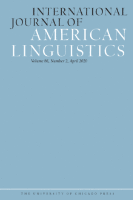
INTERNATIONAL JOURNAL OF AMERICAN LINGUISTICS
Exploring the Rich Tapestry of Language and Dialect.The INTERNATIONAL JOURNAL OF AMERICAN LINGUISTICS, published by University of Chicago Press, is a revered scholarly publication dedicated to the exploration and advancement of linguistic studies, particularly those related to the American linguistic landscape. With an ISSN of 0020-7071 and an E-ISSN of 1545-7001, this journal serves as a vital platform for researchers, professionals, and students interested in the nuances of language, dialects, and linguistic structures through rigorous academic inquiry. The journal has established a commendable impact, reflected in its ranking within the Q2 category in Linguistics and Language and its placements in the Scopus rankings, thereby positioning itself within the 50th to 53rd percentile of its respective fields. While the journal does not provide Open Access options, it continues to be a cornerstone resource for those seeking to expand their understanding of American linguistics, already converging from 1996 to 2024. Through its continued commitment to excellence, this publication remains essential for those aiming to contribute significantly to the field.
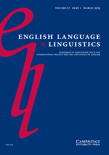
English Language & Linguistics
Advancing Knowledge in English Language StudiesEnglish Language & Linguistics is a prestigious journal published by Cambridge University Press, specializing in the dynamic fields of linguistics and language studies. With an impressive Q1 ranking in both Linguistics and Language categories for 2023 and a notable placement in the Scopus metrics, where it ranks #142 out of 1088 in Arts and Humanities, the journal is recognized for its high-quality research contributions and robust impact in the scholarly community. Since its inception in 1997, English Language & Linguistics has provided a forum for researchers to explore various aspects of language, facilitating the dissemination of innovative ideas and empirical studies. With no open access options currently available, the journal remains a valuable resource within the United Kingdom and beyond, fostering a deeper understanding of language intricacies and their broader societal implications. For practitioners and academicians alike, this journal is a critical resource for keeping abreast of the latest advancements in linguistics.

Revue Roumaine de Linguistique-Romanian Review of Linguistics
Elevating Linguistic Scholarship to New Heights.Revue Roumaine de Linguistique-Romanian Review of Linguistics, published by EDITURA ACAD ROMANE, is a distinguished journal dedicated to advancing the field of linguistics and promoting scholarly discourse in language-related research. With its ISSN 0035-3957, this journal has established itself as a valuable resource for researchers and practitioners alike, particularly within the linguistics and language categories where it holds a respectable Q3 ranking as of 2023. The journal covers a wide array of topics, focusing on both theoretical and applied linguistics, making it an essential platform for those interested in the latest developments, methodologies, and findings in the field. Although it currently does not operate under an open access model, the Romanian Review of Linguistics remains an impactful publication with its regular convergence of years from 2010 to 2023, providing a comprehensive archive for ongoing research endeavors. With its address located in Bucuresti, Romania, this journal continues to foster a vibrant academic community and supports the ongoing exploration of linguistic phenomena across diverse contexts.

CogniTextes
Exploring the Mind's Language.CogniTextes (ISSN: 1958-5322) is an esteemed open access journal published by the Association Française de Linguistique Cognitive, dedicated to the exploration of cognitive linguistics and its intersection with textual interpretation. Since its inception in 2007, CogniTextes has been a vital platform for disseminating cutting-edge research that delves into the cognitive processes underlying language use, enhancing our understanding of linguistics in a cognitive context. This journal not only fosters scholarly communication among researchers and professionals but also serves as a valuable resource for students keen on advancing their knowledge in cognitive linguistics. With its headquarters located at the University of Lille 3 in France, CogniTextes encourages contributions from a diverse spectrum of disciplines, thereby enriching the field of linguistics and cognitive studies. The journal's commitment to open access ensures that its findings are readily available to a global audience, thus facilitating knowledge sharing and academic discourse.
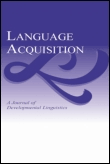
Language Acquisition
Exploring the intricacies of language acquisition.Language Acquisition, published by ROUTLEDGE JOURNALS, TAYLOR & FRANCIS LTD, is a leading academic journal dedicated to the interdisciplinary study of language development and acquisition. With an ISSN of 1048-9223 and E-ISSN 1532-7817, this peer-reviewed journal caters to professionals, researchers, and graduate students in the fields of linguistics and educational psychology. The journal boasts an impressive 2023 Scopus ranking of Q1 in Linguistics and Language and Q2 in Education, reflecting its high impact and relevance within academic circles. Notably, it is indexed among the top 15% of journals in Language and Linguistics, showcasing its significance in contributing knowledge to these vibrant fields. Although currently not open access, Language Acquisition makes a profound impact on understanding how individuals acquire language, facilitating discussions on pedagogical strategies, cognitive development, and sociolinguistic factors. The journal's historical and ongoing contributions since its inception in 1990 reinforce its position as a vital resource for advancing research and theory related to language acquisition.